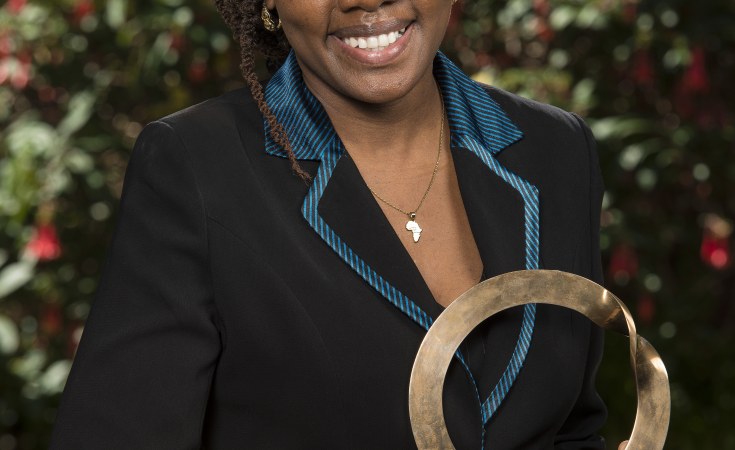As environmental activist Phyllis Omido ascended the stage at the San Francisco Opera House to accept a prize for her efforts to close down a dangerous lead smelter, the crowd could not help but notice the colors of her dress - colors reminiscent of the Kenyan flag.
Omido's dress, made in her home town of Mombasa, was a proud reminder to those watching the ceremony back in Kenya of what the country's flag stood for: the red for blood, the green for the country's natural wealth and the white for freedom, along with a Maasai shield representing the defense of that freedom.
She would elaborate to the audience on the dress a little more. "What those colors represent," she explained, "were also the principles that have fueled my environmental and human rights advocacy... for the last eight years."
Omido was one of six recipients this year of the 2015 Goldman Environmental Prize, awarded by a San Francisco-based organisation to those whom it calls "grassroots environmental heroes" around the world.
Her journey started back in 2007, when she was a young mother working in the community relations department of a lead smelter plant in the Owino Uhuru district of Mombasa when her infant son fell ill.
After a barrage of tests for everything from malaria to typhoid turned up negative, a plant manager suggested Omido have her son, named King David, tested for lead poisoning. The tests revealed that he had acute levels of lead in his system. (According to the U.S. Centers for Disease Control there is no safe level of lead for children.)
The most devastating finding was that this was most likely a result of Phyllis breastfeeding her son. Determined to act, she reached out to the community of Owino Uhuru around the smelter and soon uncovered lead poisoning stories similar to her own.
Omido would go on to establish the Center for Justice, Governance and Environmental Action (CJGEA) through which she lobbied the government to have community members tested for lead poisoning. The tests revealed that levels of lead in the soil around the smelter had risen since it had become operational, and that local children had astronomical levels of lead in their blood.
She took the findings to the management of the smelter and Kenya's National Environment Management Authority, to no avail. Shutting down the smelter became Omido's primary goal: "If they [the Kenyan government] would have listened the first time, I would probably still be working in industry," she says, "but the more they resisted it showed me how much this is wrong. I wanted to push and warn the community that this was going on."
What followed was years of organizing, peaceful street protests and letter-writing campaigns aimed at pressuring the government to close the plant. During a protest in 2012, Omido was charged with illegal assembly and inciting violence. She was arrested and jailed.
After years of effort and sacrifice, the smelter ceased operations in January 2014 and the Kenyan government agreed to pay for testing the local community and cleaning up the site and the surrounding area.
Phyllis Omido and the five other 2015 Goldman Prize recipients have in common a determination to overcome apathy and intimidation in representing under-served communities and protecting the environment.
A fellow recipient to whom Omido felt close is Berta Caceras, who organized the Lenca people of her native Honduras to push a dam builder out of indigenous lands. Phyllis says she relates to Berta because "she too has been jailed and assaulted by armed government officials."
The prize has given Phyllis the means and the visibility to continue her advocacy of the human rights of those who live around extractive industries in Kenya. Not having received a salary in more than five years, the prize "means now we have a wider scope to work with communities, and a bigger platform to address issues with policymakers back home."
Since the closing of the smelting plant, Omido has not slowed in her efforts. She has expanded the efforts of CJGEA and developed a youth empowerment division to translate its mission to the next generation.
"The more I talk to the youth the more I have hope for the future," Phyllis said.


